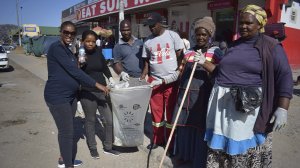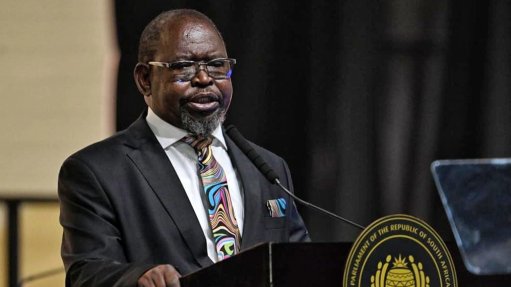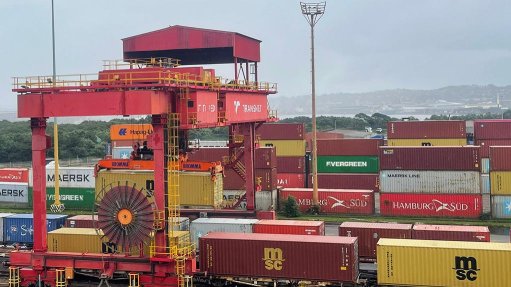Experts agree climate change discussions need to filter down to household level

Gauteng Social Development, Agriculture, Rural Development and Environment MEC Mbali Hlope shares her view about climate change engagement
As climate change becomes ever more prevalent in South Africa, stakeholders from the private sector, government, labour and civil society are increasingly engaging on points of concern and actionable solutions.
Thabo Mbeki African School of Public & International Affairs academic research director Professor Vuyisile Msila asked delegates attending the Gauteng Climate Change Summit, hosted in Pretoria on November 22 and 23, how climate change was impacting on people at community and household levels.
Delegates responded by pointing out how houses had been destroyed in recent floods, including in Cape Town, how droughts had impacted on grasslands which fed livestock and how heatwaves were impacting school learners.
Many delegates raised concerns about there not being solutions presented for practical challenges posed by climate change and that a one-government approach was lacking – for example, efforts in Ekurhuleni did not necessarily line up with those of Tshwane.
Following feedback from delegates, Msila summarised that stakeholders were asking for legislation to ensure construction of any buildings be at least 150 m away from rivers and wetlands, as well as for more education and awareness about what sustainable development meant and what households could do to mitigate against climate change.
Gauteng Social Development, Agriculture, Rural Development and Environment MEC Mbali Hlope noted the importance of engagements between all stakeholders, including communities and households, not just academics and government, to identify different perspectives and come to a common understanding of what needed to be done.
She admitted that climate change was a complex economic, social and environmental issue, especially in the context of South Africa where many people were disproportionately impacted by extreme weather events, including farmers that needed to ensure food security.
She said a key solution lay in expanding the manufacturing base, to ensure economic growth and job creation. “How we locate ourselves as innovators and directors of the type of future we want to see is important, particularly given Africa’s history of having a low manufacturing base and not beneficiating its resources.”
Additionally, Hlope said the Gauteng provincial government started charging emitters with items that gave back to the environment and not in monetary form. For example, if a transgression was worth R1-million, government urged companies to plant one-million trees instead.
If more companies did this, it would go a long way to alleviating air pollution, which contributed to climate change, she noted.
She added that all other provinces ought to follow this approach, because money to the fiscus was not necessarily used to deal with environmental damage.
Owing to the effects of pollution often being felt most intensely in low-income communities, she highlighted the importance of creating awareness on the impacts of littering, and education on separation and recycling to change consumer behaviour.
She said the Gauteng provincial government was working with buyback centres to bring recycling opportunities closer to communities where jobs could be created for waste reclaiming. This should also help alleviate the issue of many landfills in the province reaching full capacity by 2025.
“Waste is wealth. If people can be educated on the opportunities that are there, we can move more people to understanding how to handle waste and make use of the opportunities, not only to increase recycling rates but to create jobs.”
Another initiative by the provincial government involves 6 000 young people having been employed as a “cleaning and greening army” which is helping to clean up communities alongside municipalities.
Hlope’s department is also looking at potential waste-to-energy options.
Moreover, she noted that engagements on climate change needed to be packaged in a way that everybody could be part and parcel of, because that is what a “just transition” was all about.
She referred to Cabinet having adopted the Just Transition Framework which should accelerate a transition to a low-carbon economy without leaving anyone behind.
African School of Public and International Affairs executive dean Professor Sibusiso Vil-Nkomo agreed that, as a development State, South Africa could not afford to not work together and use the talent that was available to create what is usable and implementable knowledge.
He also highlighted the importance of filtering down information to household level and documenting solutions that people produced, so that other developmental States could advance their own green economies. This will also help solve the issue of migrant labour in South Africa, which is becoming a more prevalent problem in society.
Tshwane Metro city sustainability head Sello Mphaga said cities were major contributors to climate change and it was in cities where the climate battle would largely be won or lost.
The City of Tshwane has embedded evidence-planning in projects since 2013, following the establishment of a sustainability unit in the same year, to stimulate the green economy and coordinate all sustainability actions within the city.
Contained within the city’s climate response strategy is the piloting of electric buses in the next couple of years and the building of resilient transport infrastructure, among other initiatives.
WATER PERSPECTIVE
Water Research Commission executive manager Sylvester Mpandeli said national challenges of recurring droughts, population growth, urbanisation and improving living standards were exerting pressure on water resources.
The impact on the water, energy and food nexus was serious, he added, emphasising the need for more circular and polycentric approaches to resource planning and management, instead of linear approaches that have been followed historically.
More than 50% of the population is food insecure, while 98% of the country’s water resources are already allocated.
Climate change is compounding the issue of water scarcity in that, by 2030, South Africa could face a water deficit of 1.7%.
Some drivers of change will be technological developments, changed consumer behaviour and more effective waste disposal measures. Mpandeli said a big opportunity lay in hydroponics, which saved water, nutrients and energy while being a recycling system on its own.
He highlighted another opportunity as being digitalisation in agriculture, which allowed for site-specific irrigation and improved water use efficiency.
Article Enquiry
Email Article
Save Article
Feedback
To advertise email advertising@creamermedia.co.za or click here
Press Office
Announcements
What's On
Subscribe to improve your user experience...
Option 1 (equivalent of R125 a month):
Receive a weekly copy of Creamer Media's Engineering News & Mining Weekly magazine
(print copy for those in South Africa and e-magazine for those outside of South Africa)
Receive daily email newsletters
Access to full search results
Access archive of magazine back copies
Access to Projects in Progress
Access to ONE Research Report of your choice in PDF format
Option 2 (equivalent of R375 a month):
All benefits from Option 1
PLUS
Access to Creamer Media's Research Channel Africa for ALL Research Reports, in PDF format, on various industrial and mining sectors
including Electricity; Water; Energy Transition; Hydrogen; Roads, Rail and Ports; Coal; Gold; Platinum; Battery Metals; etc.
Already a subscriber?
Forgotten your password?
Receive weekly copy of Creamer Media's Engineering News & Mining Weekly magazine (print copy for those in South Africa and e-magazine for those outside of South Africa)
➕
Recieve daily email newsletters
➕
Access to full search results
➕
Access archive of magazine back copies
➕
Access to Projects in Progress
➕
Access to ONE Research Report of your choice in PDF format
RESEARCH CHANNEL AFRICA
R4500 (equivalent of R375 a month)
SUBSCRIBEAll benefits from Option 1
➕
Access to Creamer Media's Research Channel Africa for ALL Research Reports on various industrial and mining sectors, in PDF format, including on:
Electricity
➕
Water
➕
Energy Transition
➕
Hydrogen
➕
Roads, Rail and Ports
➕
Coal
➕
Gold
➕
Platinum
➕
Battery Metals
➕
etc.
Receive all benefits from Option 1 or Option 2 delivered to numerous people at your company
➕
Multiple User names and Passwords for simultaneous log-ins
➕
Intranet integration access to all in your organisation


















